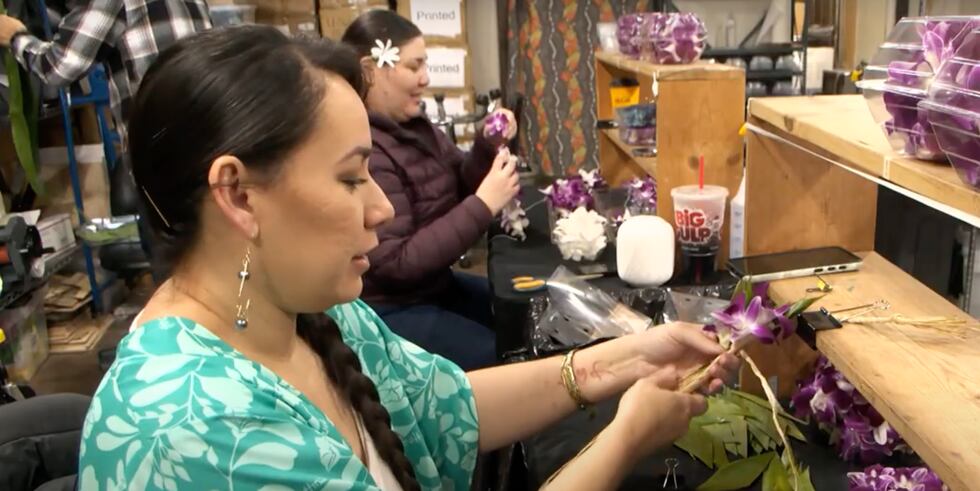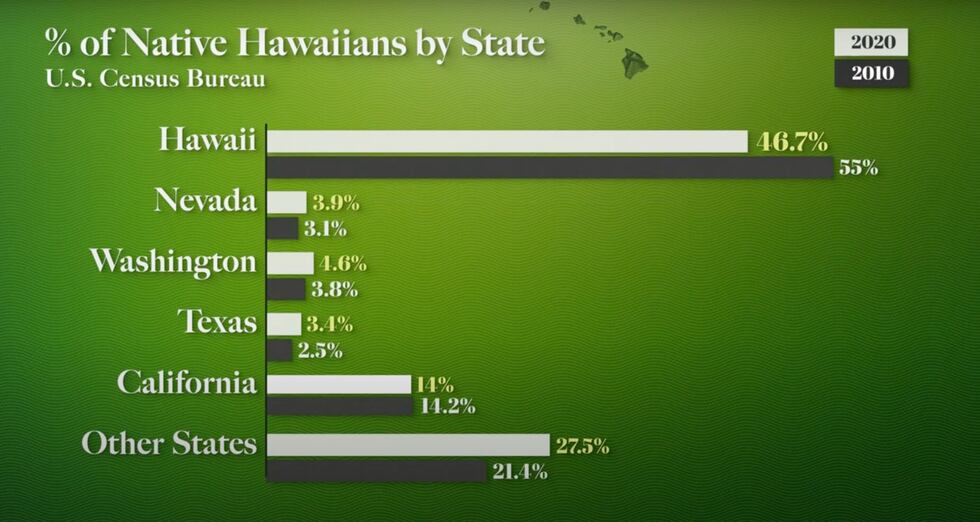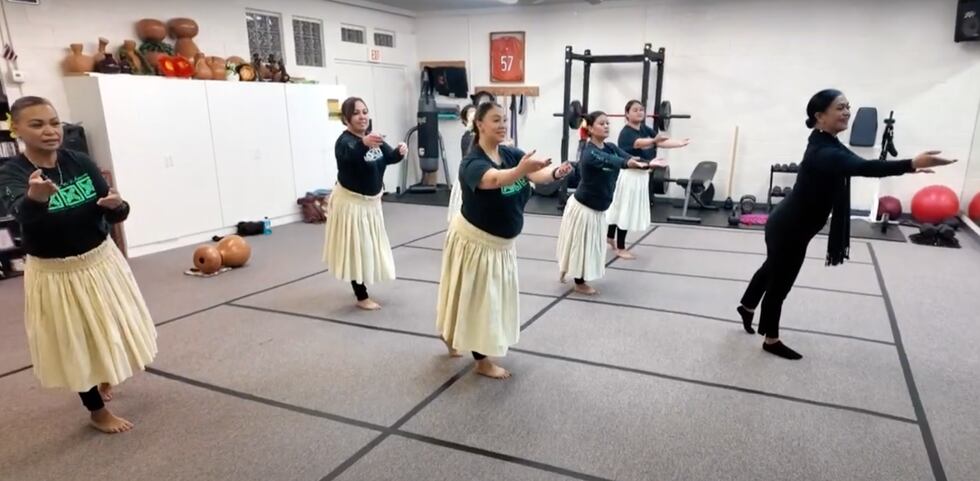HNN SPECIAL: Priced out of paradise, they’ve built new connections and community in Las Vegas
LAS VEGAS (HawaiiNewsNow) - It’s not hard to find Hawaii transplants living in Las Vegas.
“They come from all over,” says Sheldeen Haleamau, a transplant herself. “Maui, Kauai, Big Island as well.”
Beckoned not by the bright lights of the Strip but the lure of financial freedom, Hawaii natives have flocked to the Ninth Island in droves over the last decade — building a welcoming Hawaii oasis in the desert.
Because while a lower cost of living might have brought them to Las Vegas, islanders in Sin City say it is the rich efforts to perpetuate island cultures and customs there that convinced them to stay. Transplants in Vegas hold cultural festivals, open plate lunch and poke eateries, and dance with thriving halau.
“I love it,” Alijah Walter, who moved to Las Vegas from Ewa Beach, told Hawaii News Now. “The Ninth Island community is strong so we have people from home. It feels like home to be honest. It’s just cheaper.”
‘We lost a huge chunk to the continent’
The exodus of Hawaii residents to the continent isn’t a new problem — and that, in itself, is the problem.
On average, Hawaii loses a dozen residents to outmigration every single day.
From July 2022 to July 2023, more than 4,200 people left the state for good.
An even more jarring milestone: Last year, the Census Bureau announced that the majority of Native Hawaiians now live outside of Hawaii, their ancestral homeland. An estimated 370,000 Native Hawaiians are now living on the mainland, compared to about 309,000 living in Hawaii.
“We lost a huge chunk of our community to the continent,” said Kuhio Lewis, CEO of the Council for Native Hawaiian Advancement, which held a convention in Las Vegas in 2023 for the first time.
Special Section: Priced Out of Paradise
So far, efforts to stem the flow of Hawaii residents leaving the state haven’t worked. If anything, the departures have sped up — thanks to worsening inflation, soaring housing prices and the Maui wildfires.
While stopping the exodus is a now a high priority for the state, organizations like CNHA say they also have to embrace the shift — reaching Pacific Islanders wherever they are to perpetuate strong cultural ties.
“We got to look at the opportunity that it presents,” Lewis said.
Lewis calls Hawaii transplants on the continent “ambassadors” — people who can spread the aloha.
“Having assets all over the United States is very powerful. We have Native Hawaiians in all 50 states in big numbers,” Lewis said, during a recent interview with Hawaii News Now.
“What does that mean, at the federal policy making level? What could that mean for us?”
‘Your lifestyle changes’
It’s Friday night in Las Vegas and this group of friends isn’t at a craps table, but around a dining room table — playing a game of Ulus 2 Ulus, “one local kine card game.”
There’s mochiko chicken for the taking, plenty of Heineken to go around.
At this house party in Centennial, a suburb of Las Vegas, are former Hawaii residents who moved to Nevada over the last decade from all over the island chain. A school principal, a nurse, a Realtor, a truck driver.
Most of them didn’t know each other back home, but found connections on the Ninth Island — a term that’s become synonymous with Las Vegas because many see it as an extension of the island chain.
While Las Vegas isn’t the top destination for outgoing Hawaii residents, it’s a big draw for many former islanders because of the community that welcomes transplants and helps them adapt to life in the desert.

This network can suggest a place to buy a home, find a halau, direct you to the best island restaurants.
They’ll even help transplants, like Kanani Delgado, get jobs.
Delgado moved her family to Las Vegas in 2017, seeking financial stability. In Hawaii, Delgado and her husband plus their two kids lived in a two-bedroom apartment.
“We just weren’t making enough money to survive,” she said.
Delgado had a hard time adjusting to Las Vegas at first, until she was offered a job at Leilani’s Attic, along with her husband and sister. The business provides lei for celebrations in Las Vegas and across the country.
The store also sells 50th State snacks and nostalgic collectibles — a hit with transplants.
Leilani’s Attic opened six years ago when owner Tyson Camarao saw an opportunity to serve those with island connections. “We ship everything in, all our flowers come in — plumerias from Molokai, ti leaves come in from Big Island,” said Camarao, adding his own move to the mainland changed his family’s life.
“Back home, it’s like — we’re gonna go to the beach. It’s something that we can always do for free and we’ll be ‘ohana together at the beach,” he said. “Here, my kids can go experience all kinds of other things because we do have the funds to go do that kind of stuff. Your lifestyle changes, what you’re able to do.”
“Everybody wants their kids to have a better life than they did. My kids are thriving here.”
Camarao said it’s not just the cost of living that’s lower in Las Vegas. The cost of doing business is also attracting small business owners like him to Nevada, with lower taxes and start-up costs.
‘We’re bridging the gap’
Rocky Kiyuna realized his dream of opening a brick-and-mortar business in Spring Valley, Nevada. He owns Grindz 2 Da Max. In Kapolei, it was a food truck — doing well but not doing well enough to open a standalone eatery. “We did a trip up here, vacation, and we loved it,” he said. “We went back home, sold everything.”
His wife also works at the restaurant along with their three kids.
Their most popular dishes — the dynamite chicken katsu and fried noodles.
In the Blue Diamond area of Las Vegas, close to the University of Nevada Las Vegas campus, you’ll find Halau Hula ‘O Kaleimomi. Sheldeen Haleamau opened the studio in 2002, purchasing the property in hopes of spreading aloha among not only former Hawaii residents but to everyone who might be interested.
To reach her students, she soon learned she needed to adapt.
“You have to teach in a different way ... that they would understand, especially the language because we would do both auana, kahiko, Hawaiian, English,” said Haleamau, who won the coveted Miss Aloha Hula title at the 1988 Merrie Monarch Festival. She brought her dancers to the festival in 2009, 2010 and 2012.
“An opportunity for them to experience Merrie Monarch was a huge step,” she said.
Kaleinani Bacarro was one of those who graced the big stage. She has been dancing hula for 40 years.
Baccarro left Kauai in 2004, bought a house in Las Vegas and joined the halau to continue connecting with her culture. “We’re bridging the gap between the islands and Las Vegas,” she said. “Because Las Vegas is in the middle of the desert ... we’ve had to learn to develop the resources we have, the seasons, the flowers.”
Adjustments aside, the dancers of Halau Hula ‘o Kaleimomi say perpetuating culture is critical — no matter where you are. And the Council for Native Hawaiian Advancement couldn’t agree more. They’re hoping some Hawaii transplants will someday answer a calling to return home, but realize that for that to happen, opportunities will need to open up and housing and other costs will need to come down.
More resources also need to be more available for residents, they say.

‘A home away from home’
Lewis, of CNHA, said there is hope in the push to convince people to stay in Hawaii.
An infusion of public monies for the Department of Hawaiian Home Lands, embarking now on a building spree, is one key source of optimism. “What we see just on the immediate horizon is hundreds of homes are starting to come up,” she said. “I wish we had that sooner because that could have helped so much more families stop moving. But ... you can start to see some of these problems being addressed.”
Professor Colin Moore, director of the Public Policy Center at the University of Hawaii at Manoa, said DHHL has “made progress” on key promises. “I also think we’ve made progress in terms of understanding that one of the reasons we don’t have enough affordable housing is because we’ve made it incredibly expensive to build,” Moore told Hawaii News Now. “And if we make it cheaper to build, we can build more housing.”
One central focus area has been permitting woes, especially on Oahu. The city, for example, recently revealed artificial Intelligence software will be used to speed up the permitting process and fewer regulatory obstacles are hopefully ahead. “That is not going to be solved overnight. It’s not going to be solved in the next three years,” Moore said, referring to the myriad of issues driving up Hawaii’s cost of living.
“But I’m going to give policy makers credit for taking a hard, careful look at what we need to fix not just ... more affordable housing, they’ve taken a careful look — with help from economists — to understand what are the policy changes that need to be made” to slow the outmigration numbers or reverse them altogether.
For now, though, business ownership remains out of reach for many in the islands.
The only solution for some — leaving the state to pursue opportunity.
That’s what Joel Acoba did. Last year, the Kauai native started Tropiks Ink in Summerlin. Opening his own tattoo shop had been a dream of his for more than a decade. But he wouldn’t have even tried to launch the shop on the Garden Isle. In Nevada, he benefitted from lower taxes, lower employment costs and better access to supplies. It all added up and his business goals, out of reach in Hawaii, penciled out.
RELATED COVERAGE:
- The gap between median home prices and household income in Hawaii? It’s ‘scary’
- AUW: Half of Hawaii’s children are living in homes that can’t afford the basics
- High cost of living continues to drive more Native Hawaiians out of the state
- Singapore’s homeownership rate is 80%. Could a housing solution there work in Hawaii?
- Hawaii’s high cost of living testing patience of residents, poll shows
“Everybody from Hawaii is bringing the stores, the restaurants here,” he quipped.
Another tattoo shop that specializes in Polynesian art, Kulture Ink, is situated in a place called Paradise.
“I feel like Vegas is a home away from home,” said tattoo artist Tama Notise, who was born and raised in Kalihi. In Las Vegas, he said, he can work the hours he needs while his wife stays home with the kids, something that would not have been possible in the islands. “I’m happy here,” Notise said.
“I feel like this will be ... more longevity for me.”
Hawaii entrepreneurs in Las Vegas say more business support back home might have given them the resources they needed to kickstart their dreams in the islands. Camarao, of Leilani’s Attic, said even the right educational opportunities might have given him the tools to understand how to make it work in a challenging business environment. “Learning about financing and accounting and things like that,” he said.
Increased tax breaks for start-up and lower interest loans would have made a difference, too, he said.
Cynthia Yamasaki, the Oahu director for the Small Business Development Center, said there are efforts to bolster the help made available to those interested in starting a business. Among them: Free monthly webinars that will teach aspiring business owners the ins and outs of launching in Hawaii.
“All the information you need to consider, not just producing and selling a product but the legal aspects, the taxes, accounting and recordkeeping so we educate people on what it takes to be an entrepreneur,” she said.
There is also one-on-one consultation.
For those needing storefront leases, Honolulu’s Office of Economic Revitalization is working to get city ordinances changed to give start-ups first dibs on renting available commercial space in buildings owned by the City and County of Honolulu — like a number in Chinatown with affordable housing units above.
“The reality is, we need to be a part of this economy so we can thrive here,” Lewis said, adding that addressing the challenge of outmigration will require many changes — not just one or two. “So it’s not just mainland corporations, it’s local people. we got to change the fabric of how we do business.”
‘So many Hawaii people here’
It’s a blustery day in Paradise — the suburb of Las Vegas, that is, but Hawaii transplants are out in force. They’ve flocked to a pop-up event of Hawaii-centric business. Small business owners offer one-stop shopping for everything from poi mochi to lumpia while a local radio station played Hawaiian music.
Events like these are a draw for Hawaii natives like Mike and Juliet Chaney — two elementary school sweethearts from Molokai who moved to Las Vegas in 2017 to be closer to their daughter while she attended college in Colorado. The move also offered their high school-aged son more opportunities in basketball.
“In Vegas, they were going to California, Arizona, he’s been to Chicago — and then playing with mainland kids, they’re taller, stronger,” said Juliet Chaney, a nurse for the school district. Her husband trains truck drivers for a document shredding business. The financial benefits in Las Vegas were a bonus for them.
“The groceries, like no tax on your groceries,” said Juliet Chaney.

Mike Chaney added, “The cost of fuel is lower than Hawaii.”
And while property taxes are higher in Nevada, overall home prices are much lower. With a hot housing market, the median home price is Las Vegas home is about $475,000, according to bankrate.com. Hawaii’s median price for a single-family home is just over $1 million and much higher in many Oahu communities.
Judy Susuki moved to Las Vegas from Kahului in 2017 to be near her daughter in college and became a Realtor, focusing on Hawaii residents moving into Nevada. “When I moved here, I got interested in real estate, properties here are so much cheaper and bigger,” she said, during a recent interview.
“I realized there are so many Hawaii people moving here and I just love helping those people.”
Amid a rise in home prices in the Las Vegas metro area over the last several years, Texas has seen more Hawaii transplants than any other state, according to the most recent Census figures. But Nevada remains a popular destination — and one officials are focused on as they try to convince residents to stay put.
‘It’s too expensive here’
Government leaders and policymakers note that outmigration doesn’t just mean a brain drain, but impacts residents staying behind in just about every industry — from tourism to education to health care. The worsening shortage of health care workers is a particular cause for concern.
One recent analysis by Wallethub examined the average salaries versus cost of living for physicians to practice medicine in every state. Hawaii ranked 51st in the nation, behind even the District of Columbia.
Dr. Kelley Withy, director of the Hawaii/Pacific Basic Area Health Education Center at the John A. Burns School of Medicine, said Hawaii was a pioneer in the 1970s when it assured low-cost health care to anyone who was working 20 hours or more. But to keep health insurance rates low, the pay for doctors and other health care workers is also relatively low. “It’s low compared to the entire rest of the country,” she said.
“Sometimes half of what you can make somewhere else.”
To offset the financial burden of remaining in the islands, JABSOM worked on the creation of HELP, the Healthcare Education Loan Repayment program. It’s funded with a mix of state, federal and private donations and has already helped 500 health care workers chop away at their education loans.
Eludrizza Tabisola-Nuesca called the aid from HELP “huge.”
“I have no words for it that’s how big it is, like you win the jackpot,” she said.
Tabisola-Nuesca is a nurse practitioner at Kapiolani Medical Center for Women & Children and, after graduation, had $100,000 in student loans. The HELP plan is now paying it down — $25,000 per year as long as she continues to work in Hawaii. Prior to joining the program, she pondered a move to Texas.
“I told my husband it’s time to move. We gotta go. It’s too expensive here,” she said.
Now, they’re staying — thanks to the innovative program.
Onlookers say it’s efforts like the HELP program that are crucial to turning the tide on Hawaii’s worsening outmigration problem. It’s one step among many aimed at keeping residents put and bringing others home.
Copyright 2024 Hawaii News Now. All rights reserved.















